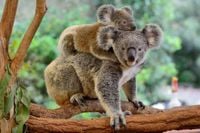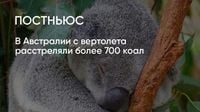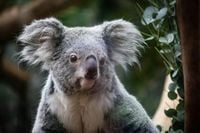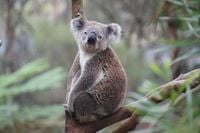In a controversial decision that has sparked outrage among animal rights activists, the government of Victoria, Australia, sanctioned the culling of approximately 750 koalas from helicopters. This drastic measure was taken in response to the devastation caused by recent forest fires that ravaged over 2,000 hectares of eucalyptus habitat, leaving the koalas without food and on the brink of starvation.
Beginning in early April 2025, snipers from helicopters began the operation in Budj Bim National Park, a region heavily affected by the wildfires. Authorities, including the Department of Energy, Environment and Climate Action of Australia (DEECA), justified the culling as an "extreme but necessary measure" to prevent further suffering among the koalas, many of which were reported to be wounded, dehydrated, and starving.
Victorian Premier Jacinta Allan defended the decision, stating that it was made after a thorough assessment of the situation. She emphasized that the killed koalas were in severe distress, and the culling was intended to alleviate their suffering. "We had to make a difficult decision based on the information available to us," Allan explained.
However, the move has faced fierce criticism from animal rights advocates and environmentalists. Jess Robertson, president of the Koala Alliance, expressed skepticism about the ability of snipers to accurately assess the health of the koalas from a helicopter. "It’s impossible to evaluate the condition of these animals from that height," she stated, raising concerns that healthy koalas could have been mistakenly targeted.
Additionally, George Purcell, a deputy from the Animal Justice Party, highlighted potential oversight in the operation, particularly regarding female koalas that may have been carrying young in their pouches. "No one is checking if the mothers have babies, and that could lead to the death of unborn koalas," Purcell pointed out, calling for more humane and thorough assessment methods.
The culling has reignited discussions about the status of koalas in Australia, which were classified as endangered in 2022 due to habitat loss and the increasing frequency of wildfires. The destruction of eucalyptus forests, their primary food source, has been a significant factor in their declining population.
As the debate continues, animal rights activists are demanding an independent investigation into the actions taken by DEECA and the government. They argue that alternative solutions should have been explored before resorting to such drastic measures. Many believe that better habitat management and rehabilitation strategies could have mitigated the need for culling.
Protests have erupted across Victoria, with activists gathering to voice their disapproval of the culling. Signs reading "Save Our Koalas" and "Koalas Are Not a Problem to Be Shot" have become common sights at rallies, as public sentiment grows against the government’s decision.
The issue of wildlife management in the wake of natural disasters is complex, and this incident has highlighted the delicate balance between protecting endangered species and addressing ecological crises. As climate change continues to exacerbate the frequency and intensity of wildfires, the plight of the koalas serves as a stark reminder of the challenges facing wildlife in Australia.
In the wake of the culling, discussions are also turning towards long-term solutions for koala conservation. Experts suggest that habitat restoration and the establishment of wildlife corridors could help support the remaining koala populations. Furthermore, increased funding for wildlife care and rehabilitation programs may provide alternative avenues for addressing the needs of affected animals.
As the situation unfolds, the Victorian government faces mounting pressure to reevaluate its wildlife management policies and consider more humane approaches to conservation. The culling of the koalas has sparked a national conversation about the responsibilities of governments to protect endangered species and the ethical implications of wildlife management practices.
With the future of the koala population hanging in the balance, advocates continue to push for changes that prioritize animal welfare and environmental sustainability. The debate over the culling is far from over, and it remains to be seen how the government will respond to the outcry from both the public and conservationists.
In conclusion, the culling of 750 koalas in Victoria has opened up a critical dialogue about wildlife management in Australia, the impact of climate change, and the ethical considerations of conservation efforts. As the situation develops, it is essential for all stakeholders to engage in constructive discussions that lead to effective and humane solutions for the protection of vulnerable species.





